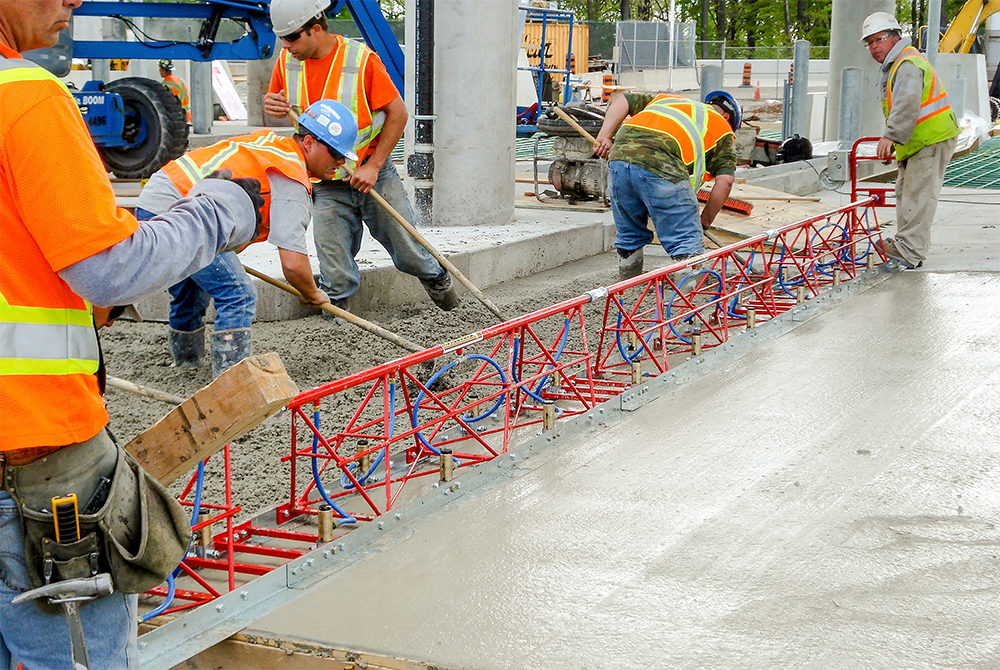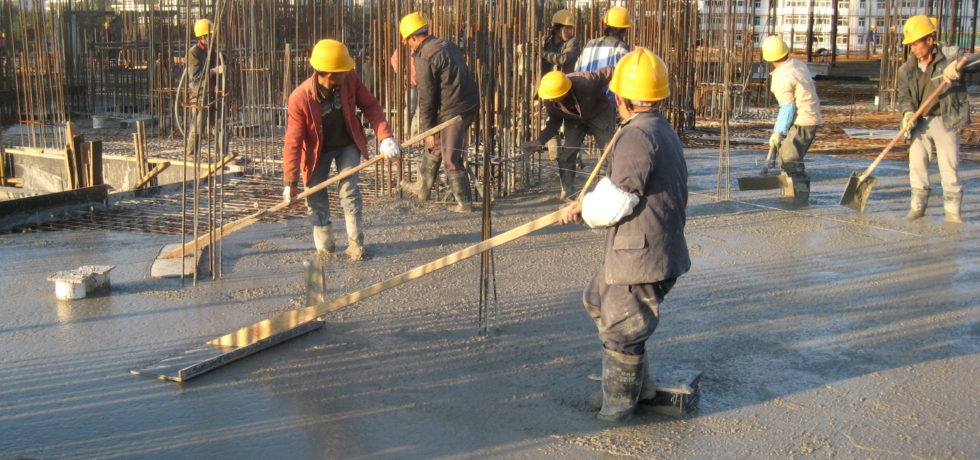Understanding Structural Requirements with West Coast General Engineering concrete foundation: A Complete Guide
Understanding Structural Requirements with West Coast General Engineering concrete foundation: A Complete Guide
Blog Article
The Necessary Function of Concrete Foundation in Structural Integrity and Durability
When it concerns constructing a home, the foundation is a lot more crucial than you could assume. Concrete foundations give unmatched toughness and toughness, guaranteeing your framework can endure various ecological difficulties. Without a strong base, you take the chance of prospective issues like changing or fracturing, which can endanger safety and security and value. Recognizing the nuances of concrete foundations could be the trick to maintaining your investment for several years ahead. So, what should you think about following?
Recognizing the Significance of Concrete Foundations
Concrete foundations are important to the overall security of any type of structure, as they give the crucial assistance required to stand up to different loads and ecological conditions. When you consider developing a home or a commercial area, the structure is the very first point you must consider. It functions as a barrier versus moisture, shielding your building from water damage. A well-placed concrete foundation also stops settling and shifting, which can bring about cracks in wall surfaces and floorings. You'll desire to guarantee that the structure is correctly made and reinforced, as this influences the longevity of your building. Additionally, a strong structure can enhance power efficiency by minimizing air leaks. Remember, disregarding the significance of a concrete structure can bring about costly repair services down the line. So, buying a high quality structure upfront is essential for the stability and longevity of your structure.
Advantages of Concrete Structures for Architectural Integrity
While numerous aspects add to a structure's structural stability, concrete structures use unparalleled resilience and stamina. You'll appreciate that concrete can stand up to severe weather condition problems, standing up to both dampness and temperature level variations. This strength means your structure is less likely to experience splitting or changing with time, which can endanger its safety.Additionally, concrete's integral weight gives a strong base, protecting against activity throughout all-natural events like quakes or floodings. When you pick a concrete structure, you're also choosing reduced upkeep; unlike timber, it will not rot or bring in parasites, conserving you money and time in repairs.Moreover, concrete's fire resistance uses added safety, ensuring your framework can sustain high temperatures without considerable damage. Overall, spending in a concrete structure implies you're prioritizing the long-term security and honesty of your structure, making it a smart option for any building and construction task.
Typical Types of Concrete Foundations
When it involves constructing structures, comprehending the common sorts of concrete structures can assist you make educated selections for your job. The most widespread types consist of slab-on-grade, crawl area, and full cellar foundations.A slab-on-grade foundation is a simple, cost-efficient choice, where a thick concrete slab is put directly on the ground. This kind works well in cozy climates, as it lessens heat loss.Crawl room foundations boost the home somewhat over ground, enabling ventilation and accessibility to plumbing and electric systems. This style can help protect against wetness issues.Full cellar foundations supply additional living or storage room while offering excellent architectural support. They call for more excavation and are commonly utilized in cooler climates to stop frost heave.
Aspects to Think About When Creating a Concrete Foundation

Finest Practices for Installing Concrete Foundations
When you're mounting a concrete structure, proper website preparation is necessary to ensure stability (West Coast GE Concrete contractors). You'll also require to understand reinforcement strategies to boost strength and longevity. Lastly, do not neglect the healing procedure, as it plays a fundamental function in achieving a solid structure
Site Prep Work Relevance
Although it might seem straightforward, proper site prep work is crucial for guaranteeing a strong and resilient concrete structure. Start by getting rid of the area of any kind of particles, greenery, or natural product that could compromise the structure's stability. Next off, analyze the soil type and compaction; you could need to dig deep into or add products to produce a secure base. Level the ground to assure also weight circulation and prevent working out issues later. Installing correct water drainage systems is also vital to prevent water buildup, which can weaken the foundation in time. Ultimately, define the foundation's dimensions properly to lead the pouring procedure. By complying with these actions, you'll set the stage for a successful concrete foundation that stands the test of time.
Support Strategies Explained
As soon as the website is appropriately prepared, the next step in ensuring a durable concrete foundation involves executing efficient support techniques. You need to begin by utilizing steel rebar, which provides tensile toughness and aids protect against fracturing. Lay the rebar in a grid pattern, making certain it's elevated making use of spacers to keep proper insurance coverage. Additionally, consider using wire mesh for extra assistance, particularly in areas based on hefty loads. Do not fail to remember to link the rebar junctions safely with cord. For bigger structures, investigate this site fiber support can enhance resilience, reducing the risk of shrinking fractures. Always adhere to regional structure codes and standards to ensure conformity. By applying these support strategies, you'll considerably increase your foundation's toughness and durability, laying a strong groundwork for your structure.
Treating Process Basics
To guarantee your concrete structure cures properly, it is necessary to keep appropriate wetness and temperature conditions quickly after pouring. Start by covering the surface area with a wet cloth or plastic bed linen to keep moisture. This keeps the concrete hydrated, protecting against fractures and making sure strength. You should likewise monitor the temperature level; excellent curing conditions are between 50 ° F and 90 ° F. If it's too warm, mist the surface area routinely to stop rapid evaporation. For winter, think about making use of shielding blankets to keep warmth. Go for a healing period of at the very least seven days, as this is important for optimum stamina development. By following these ideal methods, you'll improve your structure's resilience and longevity, making sure structural integrity for years to find.
Maintenance of Concrete Foundations for Longevity
To maintain your concrete foundation solid and enduring, regular inspections are essential. You need to likewise guarantee efficient water drainage options remain in place to stop water damage. If you identify any kind of splits, resolving them without delay will conserve you from larger troubles down the line.

Regular Evaluations and Assessments
While normal examinations and assessments could look like a job, they're essential for maintaining the advice stability of your concrete structure. By consistently examining for splits, changes, or indicators of wear, you can catch possible problems before they rise right into expensive repairs. Search for any kind of water merging around the structure or uncommon settling, as these can signal underlying troubles. It's likewise important to monitor any type of changes in your house's structure, like doors that stick or windows that do not open efficiently. Keeping a document of your evaluations aids track modifications with time, enabling proactive upkeep. Inevitably, these assessments ensure your structure remains secure, sustaining the long life and safety and security of your whole structure. Do not ignore this critical facet of homeownership!
Effective Water Drainage Solutions
Regular inspections can expose problems like water drainage problems that could endanger your concrete foundation's security. To prevent water build-up, assure your gutters and downspouts straight water away from the foundation. Installing French drains can efficiently redirect surface and groundwater, reducing pressure on your structure walls. In addition, grading the dirt around your home aids assure that water streams away, rather than pooling near your useful content foundation.Consider using sump pumps in locations prone to flooding, as they proactively remove excess water. Frequently examine for obstructions in drainage systems and clear them immediately. You'll shield your foundation's honesty and durability by taking these proactive steps. Remember, reliable drain options are important for preserving a strong, long lasting concrete foundation.
Prompt Crack Fixes
When you observe fractures in your concrete foundation, resolving them quickly is crucial for keeping its longevity. Little cracks can swiftly develop into larger issues, endangering the architectural honesty of your home. On a regular basis examine your structure for indicators of damages, such as horizontal or upright splits. If you identify any kind of, do not wait-- fix them quickly. You can use epoxy shots or concrete patching compounds, which are effective for securing splits. Constantly adhere to the producer's guidelines and think about seeking advice from an expert for substantial damage. Keep in mind, prompt repair work not just enhance your structure's toughness however likewise conserve you cash over time by preventing much more extensive repairs down the line. Keep proactive, and your foundation will stay strong and safe and secure.
Resolving Common Problems With Concrete Foundations
Concrete structures can encounter numerous problems over time, making it important to determine and address them promptly. One of the most typical problems is breaking, which can occur because of temperature fluctuations or clearing up soil. If you discover splits, it's important to assess their size and depth; little cracks can usually be secured, while bigger ones might need specialist evaluation.Water breach is an additional significant concern. Excess moisture can cause mold development and structural degeneration. Warranty correct drainage around your foundation to reduce this risk. Additionally, seek indications of changing or bowing walls, as this can show underlying problems with your structure's stability.Regular assessments are fundamental to capture these troubles early. If you find any kind of concerning signs, do not hesitate to consult a structure specialist. By remaining aggressive, you can maintain the integrity and long life of your concrete structure, guaranteeing your home stays risk-free and safe.
Frequently Asked Questions
How Does Soil Type Affect Concrete Structure Performance?
Dirt kind substantially influences concrete structure efficiency. If you have actually obtained large clay, as an example, it can trigger shifting and fracturing. Sandy dirt might bring about settling. Recognizing your dirt aids guarantee a stable structure.
Can Concrete Foundations Be Repaired if Harmed?
Yes, you can repair damaged concrete foundations. Relying on the extent of the damages, strategies like epoxy injection or piece jacking can restore security. It's ideal to get in touch with a specialist for effective options.
What Is the Common Life-span of a Concrete Foundation?
A concrete foundation usually lasts 30 to 100 years, depending on aspects like soil conditions, climate, and maintenance. You'll desire to maintain an eye on it to guarantee it continues to be healthy throughout its life-span.
Are There Choice Materials to Concrete for Foundations?
Yes, there are options to concrete for structures, like steel, wood, or also recycled materials. Each option has one-of-a-kind advantages and drawbacks, so you should consider your task's details demands when selecting the best product.
How Does Climate Effect Concrete Structure Resilience?
Climate substantially affects concrete foundation durability (West Coast General Engineering commercial concrete). Severe temperatures, dampness, and freeze-thaw cycles can weaken the material, resulting in cracks and structural problems. You need to think about local environment conditions when planning your foundation to assure long-lasting efficiency
Report this page